Genocide Ideology Must Be Defeated, Rwandans Declare (2)
-
in Popular
By Samuel Muwanguzi
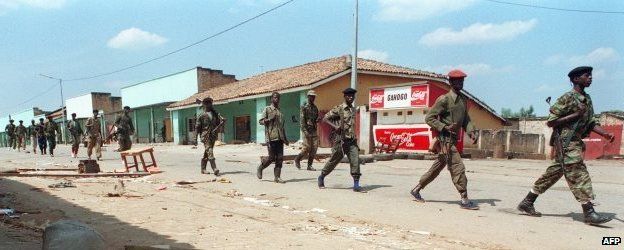
In Summary: While Rwandans are bullish about July 4, designated as a liberation Day and celebrated annually to mark the anniversary of the end of the 1994 Genocide against Tutsis, defeating the genocide ideology appears to capture their collective imagination most. Indeed, for peddlers of the genocide ideology , Rwandans will take no prisoners. They offer no apologies for this nationalistic and globalist commitment. To Rwandans, fierce rejection, unwavering condemnation, and unified commitment to defeating the genocide ideology neither contradicts the freedom of speech nor violates any known human right. Why? Exponents of the genocide ideology and those who deny its existence are agents of the most dehumanizing experiences to humanity. In their evangelical-like fervor, Rwandans are not without company. The equally ferocious opponents and upstanders against the holocaust are standing shoulder to shoulder with the Rwandans. Drawing parallels between the genocide and the holocaust, the two are moving together, toe to toe in reminding and cautioning the world that what happened in Europe during the Second World War and in Rwanda in 1994 can easily happen again anywhere in the world. Be afraid and on notice, their unified message to the world sounds unequivocal.
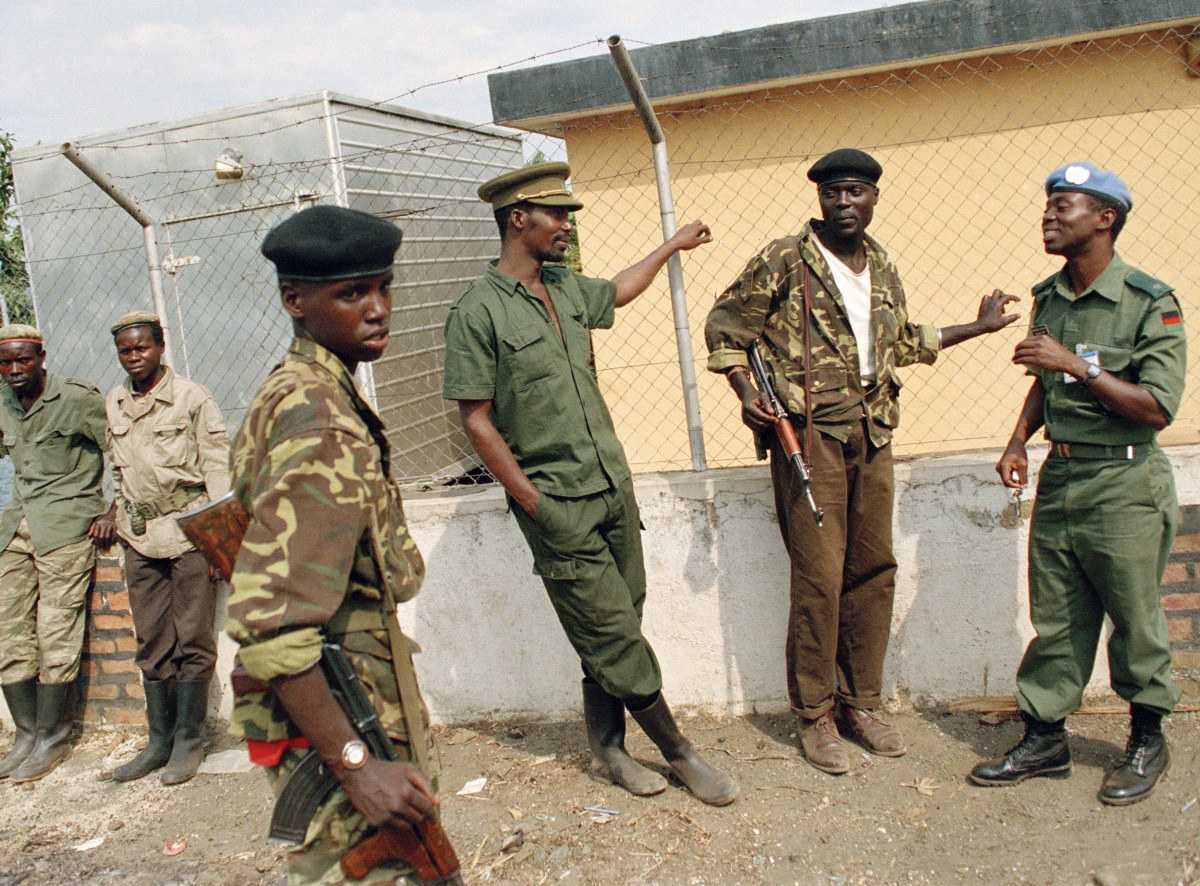
Hurst, Texas— On July 4, 1994, the Rwanda Patriotic Army (RPA) stormed the capital Kigali, took over power, and brought the genocide to an end. By then, over 800,000 Tutsis had been killed by marauding Hutu militias within only 100 days. Since then, July 4 was designated as a liberation Day celebrated annually. On such occasions, Rwandans reflect on their story of reconciliation and nation building and look to the future with hope, optimism and a renewed commitment to agaciro (dignity), self-reliance, and shared human values. For this years’ anniversary, Rwandans were both buoyant and vigilant at the same time. Coming on the heels of the 22nd anniversary commemorating the genocide by the Rwandan American Community in Dallas Fort Wort (RAC-DFW) at the Disciples of Christ Mission church in Hurst, Texas last April, echoes of commitments to defeating the genocide ideology reverberated within and among the Community.
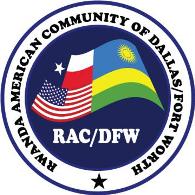
While Rwandans were bullish about July 4, designated as a liberation Day and celebrated annually to mark the anniversary of the end of the 1994 Genocide against Tutsis, defeating the genocide ideology appeared to capture their collective imagination most. Indeed, for peddlers of the genocide ideology , Rwandans will take no prisoners. They offer no apologies for this nationalistic and globalist commitment. To Rwandans, fierce rejection, unwavering condemnation, and unified commitment to defeating the genocide ideology neither contradicts the freedom of speech nor violates any known human right. Why? Exponents of the genocide ideology and those who deny its existence are agents of the most dehumanizing experiences to humanity. In their evangelical-like fervor, Rwandans are not without company. The equally ferocious opponents and upstanders against the holocaust are standing shoulder to shoulder with Rwandans.

Drawing parallels between the genocide and the holocaust, the two are moving together, toe to toe in reminding and cautioning the world that what happened in Europe during the Second World War and in Rwanda in 1994 can easily happen again anywhere in the world. Be afraid and on notice, their unified message to the world sounds unequivocal.
Indeed, during the event to commemorate the genocide against the Tutsis, declarations to oppose, fight, and defeat the genocide ideology were firmly made. First to fire the salvo was the ebullient chairman of the Rwandan Community in DFW Mr. Sam Mbanda who made it categorically clear that those who deny the genocide against Tutsi should be identified, challenged, and prosecuted because they are dancing on the graves of their innocent victims and perpetuating the sorrows of survivors, their relatives, and the entire nation. However, before taking another shot at the peddlers of the genocide ideology, Mr. Sam Mbanda welcomed the Rwandan community who turned up in big numbers and recognized friends of Rwanda who had come to be in solidarity with them. Several leaders from the African Diaspora communities from Kenya, Uganda, DR Congo, Tanzania, Burundi, and Nigeria, among others, including leaders from the East African Chamber of Commerce of Dallas and a board member of the Holocaust Museum of Dallas, graced the event.
A devoted SDA, Mr. Sam Mbanda, the RAC-DFW president, sounding as fiery as the countrymen he leads, stated: “To ensure that what happened in Rwanda in 1994 does not happen again, the Primary school curriculum has integrated the teaching of genocide to enlighten the youngsters about the dangers of the problem,” He disclosed. “The hate and greed inspired genocide should be resisted from an early age,” he said. He called for a disciplined change in the world that caters for all humanity alike. A devout Seventh Day Adventist, Sam Mbanda, citing Psalm 118:23-24, called for a “new dawn, a new era, a new day in which all God’s creations should live in harmony and as ordained by God, be glad and rejoice in it. It is what humanity need, it is what Rwanda needs, and it is what the world needs,” he declared.
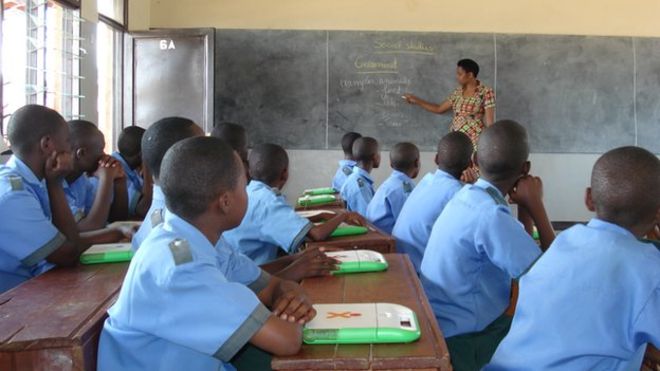
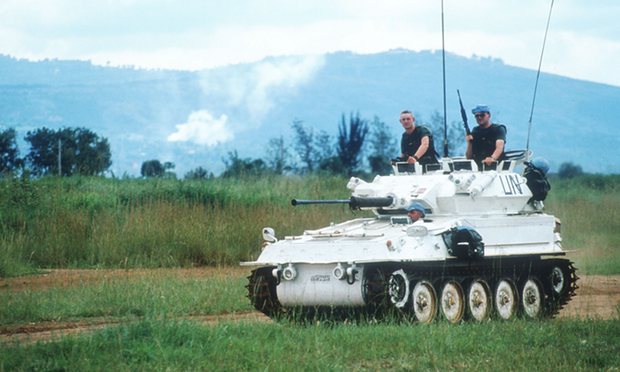
“While our brothers and sisters in Burundi are dying silently, should we be quiet and do nothing? he wondered. Yesterday is gone but tomorrow is coming and we should therefore prepare for any eventuality instead of simply standing on the fence,” he charged. Speaking after renditions of national anthems of Rwanda and the USA, a fiery sermon and prayer, a moving testimony by a genocide survivor, and a documentary depicting rescuers of hounded and helpless targets of genocide perpetuators, RAC chairman Sam Mbanda declared: “We must bring to light the truth and, most especially, find and contradict falsehoods by exposing and shaming those who are walking streets here in the USA and those who go to institutions denying that genocide took place in Rwanda. Those same people are promoting the genocide ideology. We have to stop them,” he declared to a unified chorus of ‘yeego’, (yes indeed).
On this high note, Mr. Lawrence Manzi, First Counselor and Political Affairs at the Rwanda Embassy in Washington DC, who represented Ambassador Dr. Mathilde Mukantabana, minced no words in calling peddlers of the genocide ideology to order. “The genocide ideology must be rejected, condemned, fought, and defeated.” He added, “In this protracted campaign, we should target and educate our children because they will have to continue fighting our war against genocide and win it. We therefore need to say “No” to that horrific hate ideology and change the narrative,” he declared.
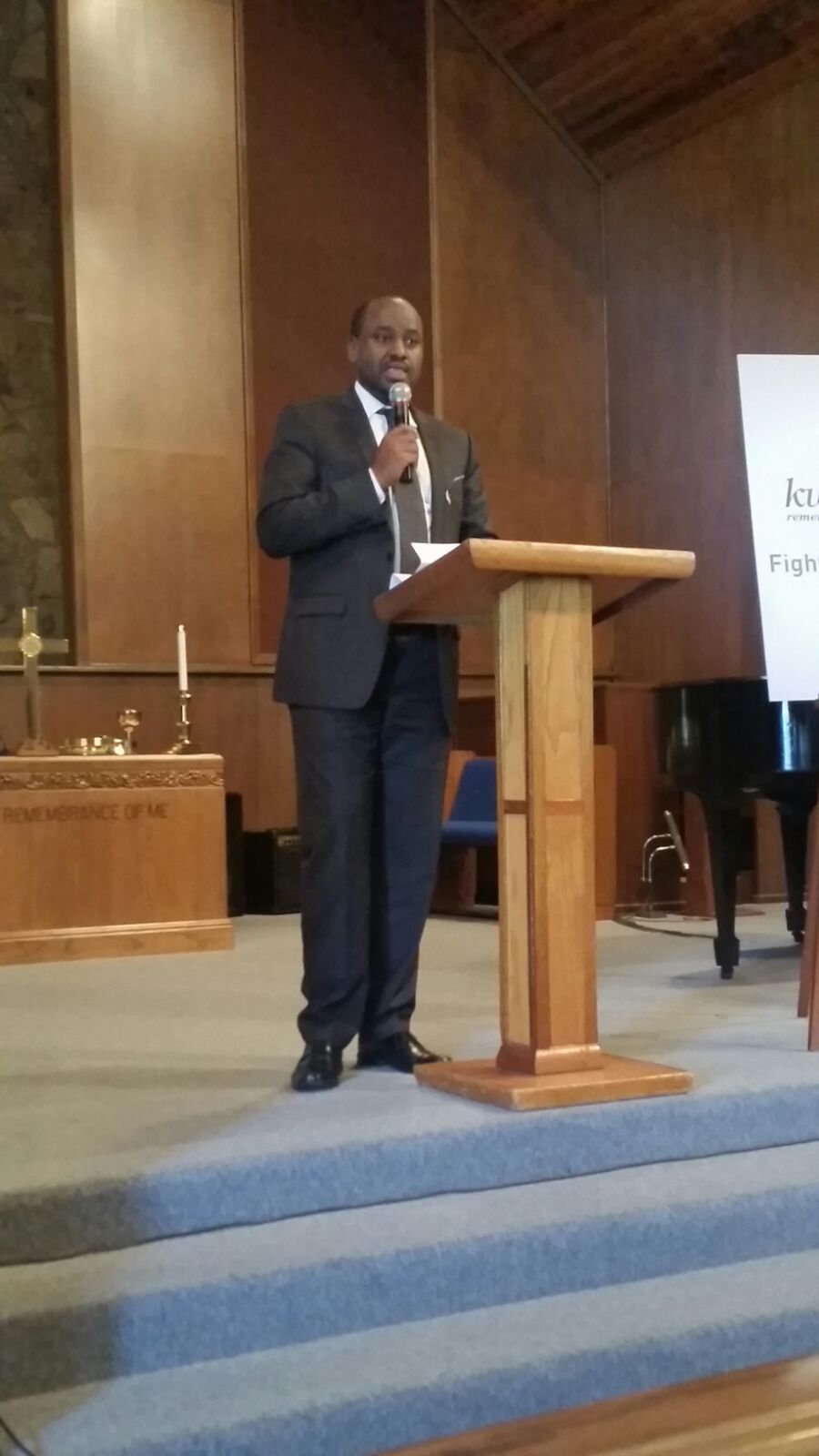
Referencing Prof. Gregory H. Stanton, President of the Genocide Watch who identified 8 stages of genocide, Mr. Manzi told the fired-up audience that only one of the eight stages involves killings or extermination of targeted victims. He said the first six stages are nurturing divisions, inspiring hate, while the seventh is the one that involves killings and the final stage, the denial stage, is even worse than the others. “Denial, the final stage, always follows genocide and includes the surest indicators of further genocidal massacres,” he observed. He said that during this final stage, perpetrators of genocide may dig up the mass graves, burn the bodies, try to cover up evidence and intimidate the witnesses, he said. He said such individuals deny that they committed any crimes, and often blame what happened on the victims; block investigations of the crimes, and continue to govern until driven from power by force and flee into exile.
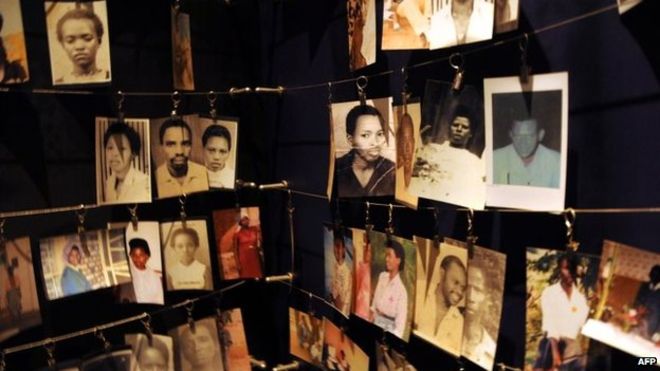
He said that response to denial is punishment by an international tribunal or national courts where evidence can be heard and perpetrators punished. While local tribunals such as the Rwanda Tribunals (Gacaca) or an international tribunal or an International Criminal Court may not deter the worst genocidal killers, with the political will to arrest and prosecute them, some may be brought to justice, he said.
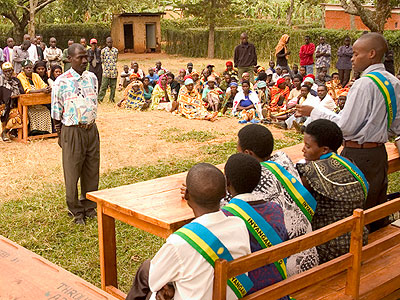
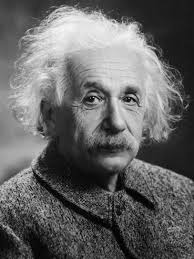
Mr. Manzi also referenced one of the world’s greatest thinkers, Albert Einstein, who challenged those who maintain silence in the wake of a genocide or holocaust and fail to speak out against the dehumanizing forms typical during such tragedies. “We unapologetically assume the role of upstanders, collectively, when bearing witness to injustice, as we decided to do something to stop or prevent the genocide ideology, a precursor to horrific acts from continuing,” he declared. Bystanders are individuals who may engage in denial, self-preservation, may lack preparation, involve in opportunism, and fear; all playing a role in shaping decisions to act, or not to act, when faced with knowledge of widespread atrocities, he said.
Mr. Lawrence Manzi castigated one Rwandan national who is going around claiming that genocide never took place in Rwanda. “There is a man going around denying genocide. He was even hosted at Texas Tech recently. This man is one of the actors in hotel Rwanda movie, a fiction film he exploits to cash-in by denying that Genocide against Tutsi ever took place. He goes around talking trash and misleading the public. We commend the Rwandan girls in Abalin, Texas who went to his appearance at Texas Tech and confronted him. He is a coward,” he declared to stumps of approval. “When we fail to decisively address the denial stage, he warned, radical groups and individuals emerge to oppress and exterminate people.” Mr. Manzi therefore declared: “There is no contradiction between the condemnation of genocide ideology and free speech. They are mutually inclusive and must be treated and viewed alike, he told his attentive listeners.
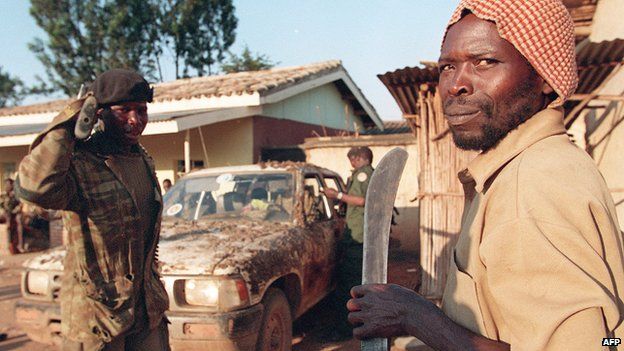
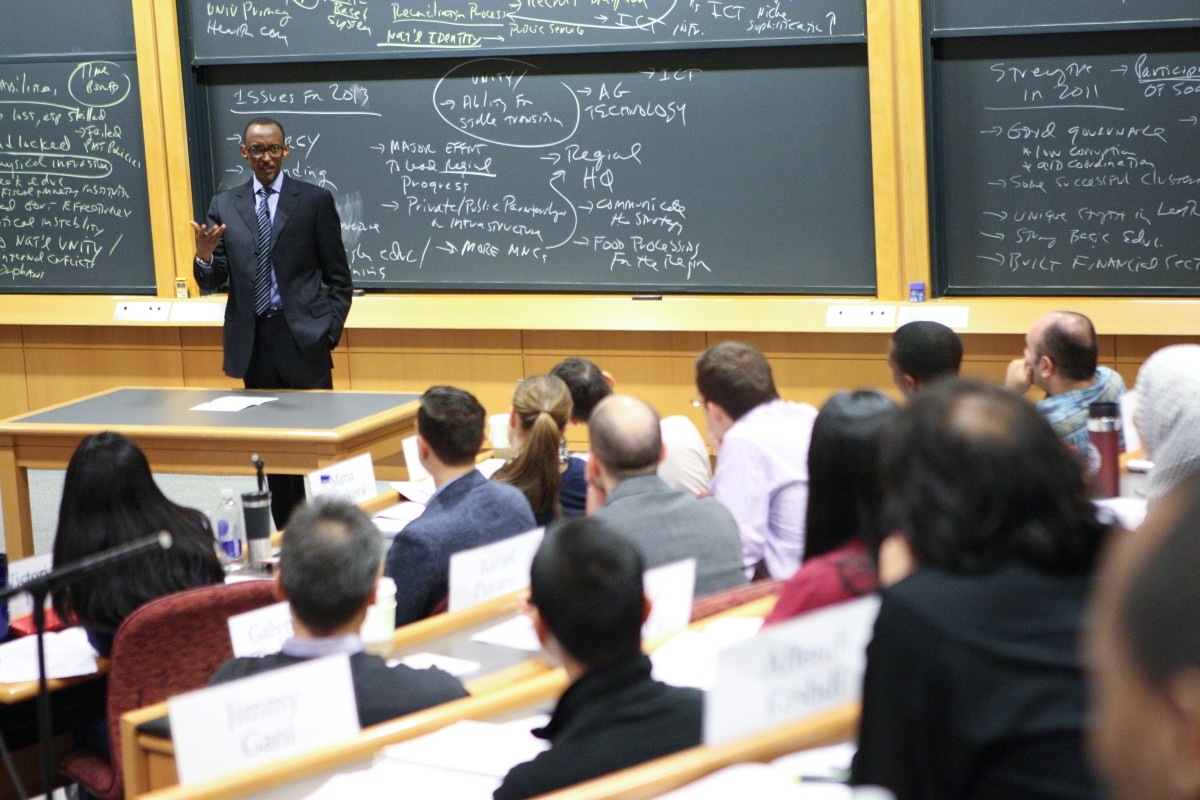
Mr. Lawrence Manzi assured his audience that Rwandans in the Diaspora are not alone in their efforts to fend for themselves and their families: “You are not alone. You have a government committed to the recovery of Rwanda; re-branding, re-building, and striving to make you feel at home and with a sense of belonging.” He told the audience that President Kagame openly declared that Rwanda is for all Rwandans; both Hutus and Tutsis. “The length of your nose does not matter anymore now as it did before. We reject the binary thinking; ‘we against them’,” he declared. Mr. Manzi disclosed that Rwanda has students in the USA on government scholarships yet their parents are in prison because they participated in the genocide. “Rwanda has changed for good and forever,” adding, “we chose to stay together, be accountable to all of Rwandans, and think big as Rwandans.”
Mr. Manzi said the government has a zero tolerance for corruption and expressed gratitude to all Rwandans in the Diaspora for remittances sent to Rwanda. He said the government decentralized power to unleash the Rwandan potential. “The 12 million-Rwanda-population is making a remarkable contribution to the world; we have troops in Central Africa Republic and in Darfur, Sudan as peace keepers and are enabling and facilitating peace in those places,” he stated with a tinge of national pride in his voice. We appeal to you to amplify voices of reason to never accept genocide to happen again; we should write a new chapter of our country, Mr. Lawrence Manzi said.
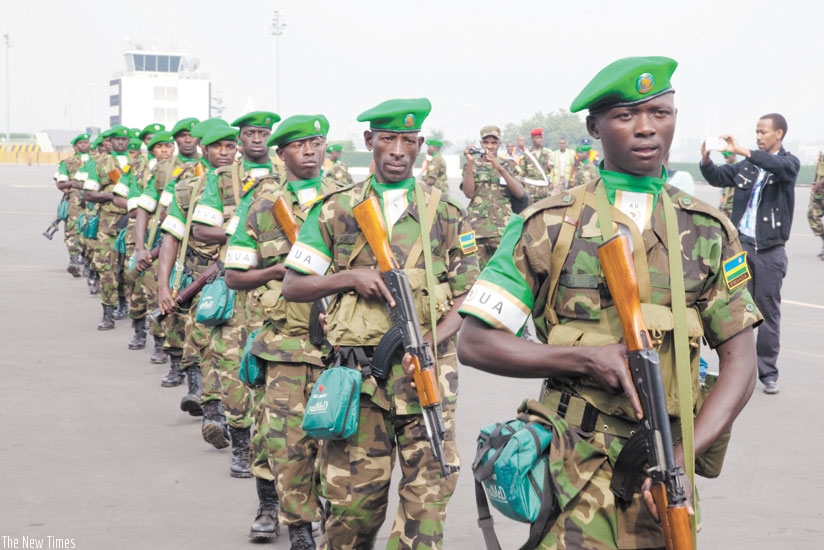
The embassy representative said that Rwandan communities abroad are equipped with sharp minded patriots who can play a big role in the campaign of fighting the genocide ideology and to tell the truth whenever those who deny the genocide against Tutsi rear out their ugly heads. He assured that the government, the Embassy, and the entire country are working hard to promote and sustain the Unity, security, and prosperity of all Rwandans to day and for generations to come.
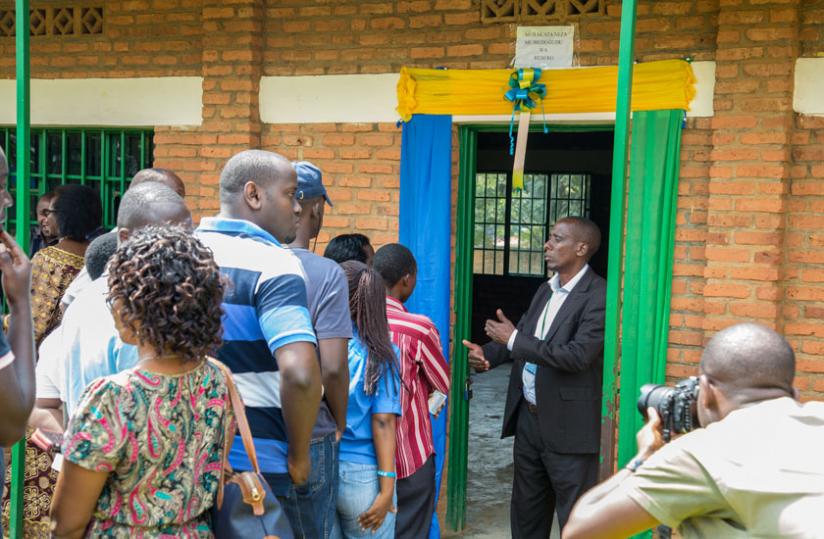
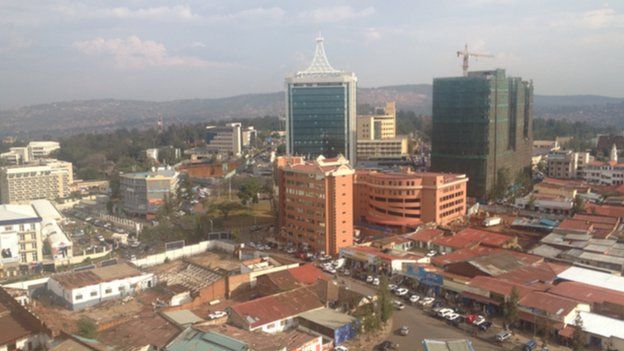
“That is why I came to be with you, the Rwandan Americans of DFW and your friends in remembering our loved ones who were killed in 1994 during the genocide against Tutsis. I promise you that the Embassy is always there and ready to help and work together with you for the greater cause of all of you living here,” he declared. He saluted the Rwandan community in DFW area for its spirit of togetherness and friendship. “These positive qualities make you unique as Rwandans standing out there to build bridges not walls,” he said. Mr. Manzi reminded the Rwandan community that “we can share our history and our bright future with our friends and neighbors, because once we share our own struggle and our own progress, we will learn from those friends and our present and future generations will have brighter prospects. Currently, the government has built a strong foundation on which a knowledge economy for posterity can be built.
Earlier, a guest speaker at the event, Mr. Paul Kessler, a Board member of the Dallas Holocaust Museum, a Jewish survivor of the holocaust in the former Republic of Czechoslovakia which supported Nazi Germany during the Second World War, expressed solidarity with Rwandans in their declared global campaign against the genocide ideology. Now a public speaker, Mr. Paul Kessler emphasized that those who deny the Rwandan Genocide against Tutsi will not just go away, but has to be challenged and exposed. “We have to tell the truth about the genocide, we have to fight the genocide ideology by exposing those who promote it,” he counseled. He gave an example of how Jews who survived the holocaust many years ago are joined by their families and friends to continue speaking out against the holocaust ideology on a daily basis, a strategy Rwandans and friends of Rwanda should embrace, modify, and pursue. “Those who deny the genocide against Tutsi and promote divisions among the people of Rwanda should be relentlessly challenged, rejected, fought, brought to justice, and thoroughly defeated,” he advised.
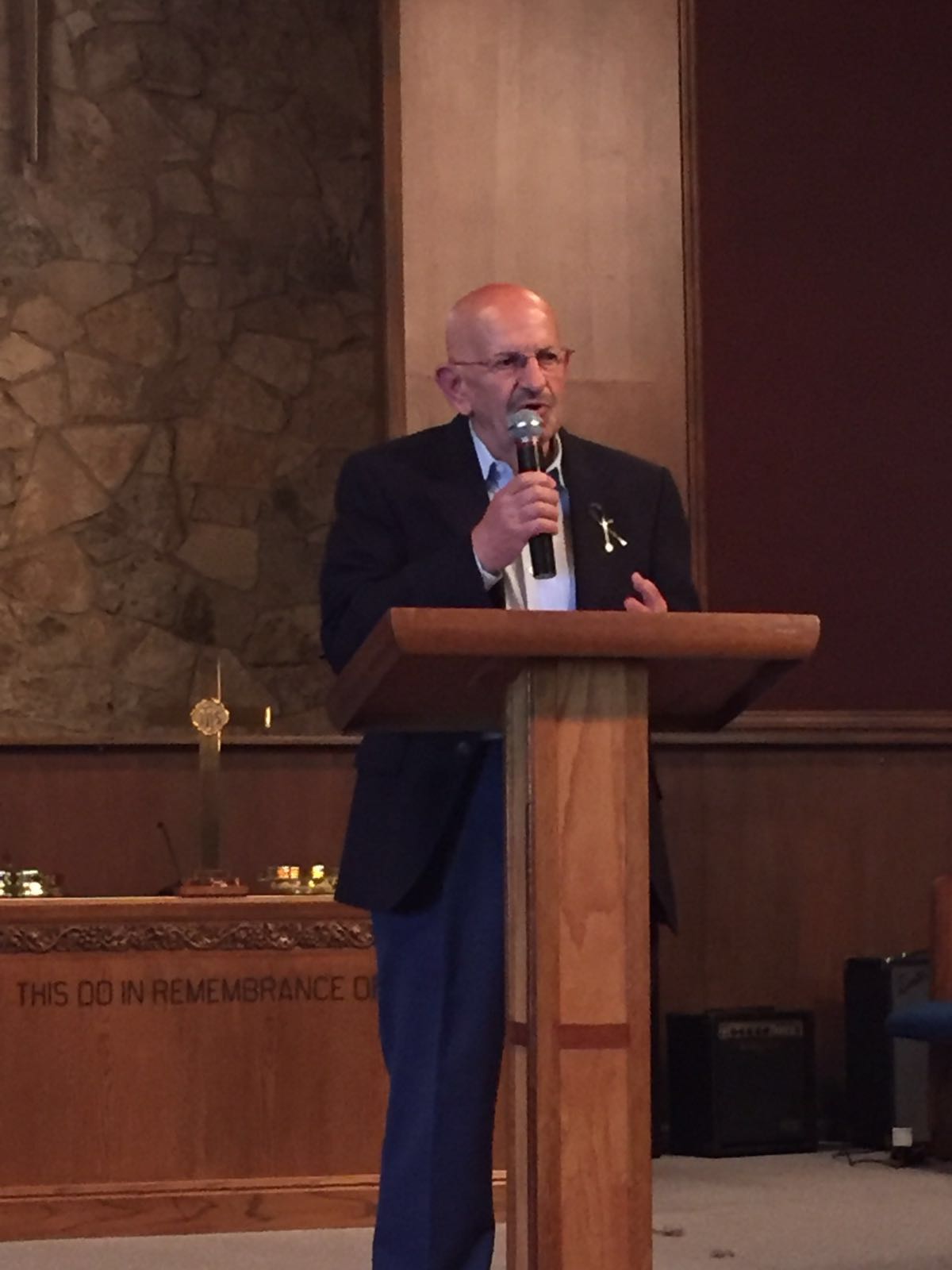
Recognizing that humanity is the same everywhere, peace-minded people should not be under the illusion that the level of development of a society can help to prevent a reoccurrence of a holocaust or genocide. “While Germany was a developed country, it did what it did, not because it was not developed but because it planted seeds of hatred and xenophobia,” he cautioned. He warned that how a civilization can turn to savagery takes a small trigger, adding, “Do not take anything for granted because anything can happen any time anywhere regardless of the level of civilization of a nation.” Vehemently, those opposed to all forms of a holocaust and genocide should stand up and declare: “Never again, never again, and, we say, never again,” he declared to a prolonged thunderous applause.

Born in 1939 in the former Republic of Czechoslovakia which supported the Germans, Mr. Paul Kessler said that in 1942, over 100, 000 Jews including his father and siblings were taken to concentration camps and killed. “I survived because I and my mother were rescued and saved by peasants near the camp of German soldiers,” he disclosed. He said that the German soldiers lived in the house of the peasants who saved us. “Would you risk your lives to protect those you do not know?” he rhetorically asked. He said that “those who saved us never knew us. Those who saved some of the survivors in Rwanda never knew them,” he observed. Referencing Einstein, he stated that the world is a dangerous place dwelled by millions of bystanders. But strive to become up-standers because when you bear witness to injustice, you decide to do something to stop or prevent acts against humanity from escalating.” He said that Albert Einstein observed that the world is dangerous by those who do nothing; bystanders.
“A few of the German guards were good and decent fellows. There are two races in the world, the decent and the not decent ones,” he observed. Be strong and keep the fight against the genocide ideology. Nearly 71 years ago, in April 1945, we were freed by Russian troops,” he disclosed. “We built the holocaust museum here in Dallas to educate people so that genocide or holocaust never happens again. I speak to over 35,000 students who visit the museum annually and use testimonies to teach these students because the stories are similar everywhere; genocide or holocaust are similar but only perpetuated and carried out by different actors,” he said. Mr. Paul Kessler said there are those who originate the genocide, orchestrate it, carry it out, and those who are killed, the victims, those who survive, and those who resist it. He regretted that although there were desperate warnings, nobody did anything just as the case is today in Syria where nobody is doing anything; nothing is happening to prevent the killings as the havoc in that country is for all to see.
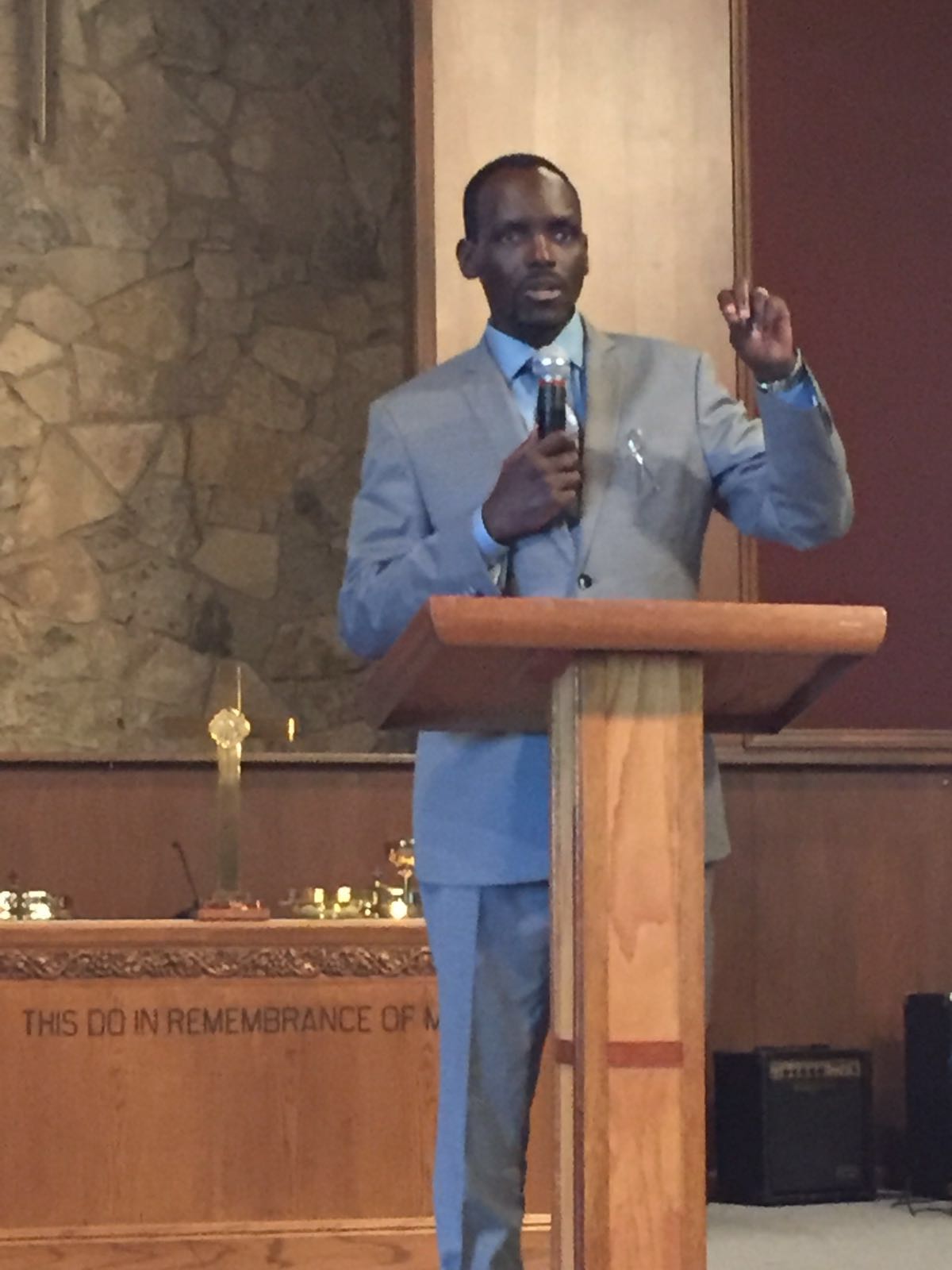
Mr. Justine Nsenga, an erudite opponent of the genocide ideology observed that the campaign against the denial of genocide against the Tutsi in Rwanda in 1994 is similar to a struggle against a historical blackout orchestrated by peddlers of the denial. He said that an ideology comprises of thoughts and deeds by its adherents. However, “let’s write and rewrite a new and good history of Rwanda,” he advised, adding, “fight against the media that denies genocide by educating the world about genocide and what exactly happened in Rwanda,” he challenged. “Let us keep alive the memories of those who perished, he charged, adding, whatever you read that denies that genocide existed in Rwanda, write a rebuttal. But, also, originate your own experiences of what happened,” he advised.
Mr. Nsenga said that more than anybody else, Rwandans living in the Diaspora have opportunities to read and react. “Write and denounce those who want to revise or deny history; re-write the new history and teach the people who are ignorant,” he fiercely charged. He said the young generation must be taught what happened and both individually and collectively, “we must make pledges to defeat the genocide ideology and never again should we allow heinous crimes against humanity to take place,” he declared. He said that with peace, gains realized by the government which are visible across Rwanda will be sustained and improved upon by future generations.
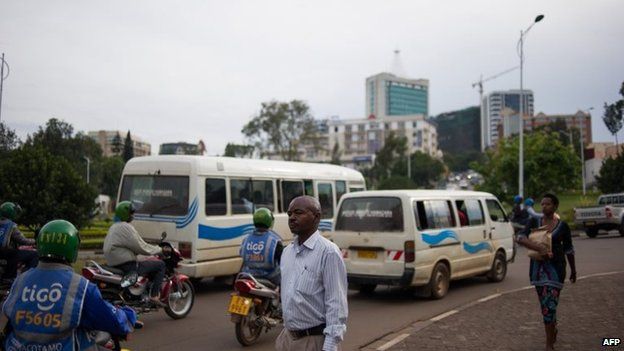
The climax of the 22nd commemoration of the Genocide against Tutsi was lighting the candle to illuminate the future path for Rwanda. Lead by Mr. Emmanuel Ngirumwe Sebagabo, the Secretary for the Rwanda American Community in DFW, the lighting of the candle is more than just symbolism but “a very important ceremony performed to honor those who were killed, for our grief, for our courage and hope, and to put light on our future and prosperous generations,” he said, adding, “we light the candle to have the flame give us the guidance in the fight against the dark genocide ideology and those who deny that the genocide ever took place.”
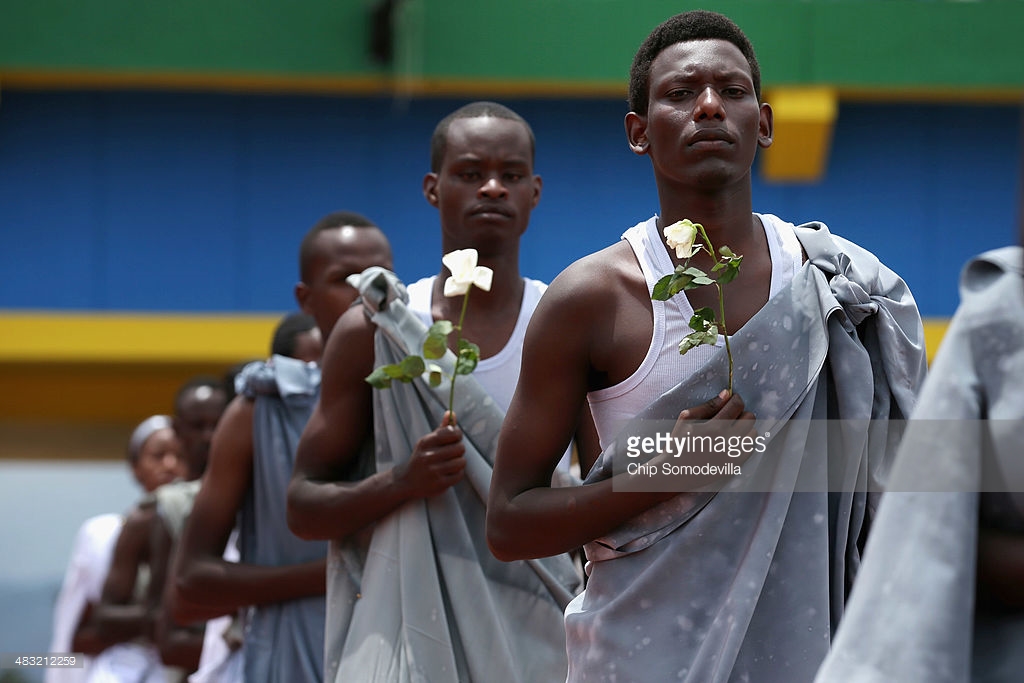
Putting all that transpired into perspective, the First Counsel and head of political affairs at the Rwanda Embassy in Washington DC, Lawrence Manzi had the last laugh as reflected in the opening remarks of his speech: “I approve of all these messages!” He had placed an endorsement seal on whatever had taken place on that warm Texas Saturday afternoon. The significance of that resounding approval was not lost on many in the audience. One perceptive Rwandan told the EADM as we filed out of the Church: “By the time Lawrence announces, the diplomatic post in Washington DC would have already acquiescenced to what the powers in Kigali had already initiated, authorized, and released for public consumption.” Why then shouldn’t we bask in the glorious standing in the books of those who made the Rwanda transformation possible?” he asked rhetorically. I could neither answer him nor begrudge him.
